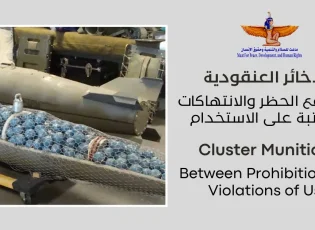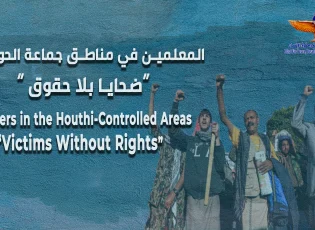Maat leads a wide UN campaign to save an Egyptian detainee in Qatar
Reports and meetings with special rapporteurs to expose Qatari violations against Egyptian Nabil Mustafa
The security agencies, the judiciary, and the Qatari economic institutions punish the victim for the peaceful expression of his opinion
Within the framework of its interest in presenting the violations that some Arab citizens are subjected to as a result of the negative practices of some ruling regimes, Maat Foundation has taken a wide-ranging move in the corridors of the UN mechanisms for the protection of human rights to save the Egyptian citizen detained in Qatar, Nabil Mustafa Hussein, who is paying the price for his peaceful political stances and facing a campaign Fierce security forces, the Qatari government and some economic institutions prevent him from leaving Qatar and from working inside or outside Qatar as punishment for expressing his opinion through his personal page on social media.
Maat has submitted formal complaints to each of the Working Group on the issue of human rights and transnational corporations and other business enterprises, the Special Rapporteur on the negative impact of unilateral coercive measures on the enjoyment of human rights, the Special Rapporteur on the human rights of migrants, and the Special Rapporteur on contemporary cases of slavery.
Maat had been I received a written complaint, as well as a videotaped message from an Egyptian citizen who was working in Qatar and is still being arbitrarily detained there, and he is the Egyptian citizen Nabil Mustafa Muhammad Hussein, an Egyptian, aged 59, who has been working as an executive director of one of the companies affiliated with the Qatari Al Sharq newspaper since December 2013 .


The Foundation succeeded in communicating personally with the complainant, and we monitored inhumane practices carried out by the government of Qatar against him, as punishment for his political stances that differ peacefully with the direction of the Qatari government, and revenge against the complainant took place in various ways based on unwritten instructions from the Qatari security apparatus. The retaliatory practices against him in the arbitrary and sudden end of his services by the Qatari Al-Sharq newspaper, as well as the Qatar National Bank (QNB) banning and confiscating his accounts and preventing him from traveling outside Qatar, and using the unjust sponsorship system to prevent him from working for any other employer based on the rights granted to it by Qatari law to refuse to transfer Sponsorship, in a way that amounts to disguised slavery, and currently the victim has been living in Qatar for two years, forbidden to work there and forbidden to leave, without any income or shelter.
Maat held several interviews with UN officials and obtained explicit promises to raise the issue with the Qatari government and work to stop the heinous violations against him. Maat explained to the UN officials that what the Egyptian citizen is exposed to is a natural product of the corruption of Qatari laws that turn foreign workers into people without rights. Qatari law gives companies the right to form unlimited work contracts for their employees, although the law gives workers the right to obtain loans from banks with the guarantee of their salary and the employer; However, at the same time, it gives companies the right to terminate the worker's services at any time and without giving reasons, and the right not to consent to the transfer of the terminated worker to any other work, by refusing to transfer his sponsorship (according to the Qatari sponsorship law). The law also gives banks the right to ban the bank accounts of the borrowing worker immediately upon termination of his services and confiscation of his dues, in addition to issuing a decision banning him from traveling, suing him and issuing a prison sentence.
Maat also confirmed in its official meetings and communications that there are thousands of workers languishing in prisons because of this unjust and unfair law, without any sin they have committed, while international law does not allow anyone to be imprisoned unless he commits a crime or violates a law. The worker whose services were terminated against his will did not commit any crime and did not violate any laws until he was punished with imprisonment after confiscating his money and preventing him from traveling and working in accordance with Qatari law.
Maat also presented evidence that the litigation process in Qatar was completely politicized in order to undermine the rights of the complainant, as the Labor Court in Qatar took 11 months in the first degree of litigation, while the case that the bank filed against him regarding the loan took 6 months in 3 degrees of litigation. , During which there were two months as a judicial leave, that is, 3 degrees of litigation expired in 4 months, and evidence was also provided of Qatar National Bank's fraud against the victim.
Maat demanded that QNB be held accountable for the use of fraudulent and fraudulent methods, to obtain the signature of one of its clients on a financial document that a bank would not have had to obtain in normal circumstances, and to exploit that document to harm the client, and to work to facilitate the victim's departure from the State of Qatar and redress the material and moral harm. What he was subjected to, and asking the State of Qatar to amend its labor laws and provide adequate protection to workers and to stop the disguised slavery practices against expatriate workers, as well as demand that the State of Qatar take everything that would accelerate litigation procedures in labor cases, and finally hold Al Sharq newspaper accountable for its practice of unfair dismissal For a worker who only used his right to peacefully express his opinion.
These moves came on the sidelines of Maat’s participation in the 39th session of the Human Rights Council, currently held in Geneva, and in line with its interest in following up the cases of victims of violations in all Arab countries, and its bet on the ability of the international mechanisms to stop the politicized practices committed by some regimes with false pretenses, and Maat confirms that it will remain The case continues on Kassab until the victim obtains his legitimate rights.




















